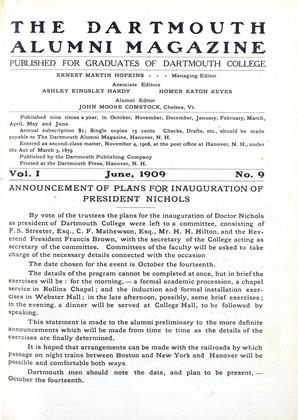At the outset of collegiate affairs, in this country at least, I apprehend that a college course was designed more particularly, if not exclusively, for those who were contemplating a profession, but as views broadened it gradually dawned that a libera] education would perhaps help and certainly could not hinder those with other pursuits in mind, so that now it is considered almost a necessity, if it is practicable, for all to have it, and statistics are available which show that hosts of those who entered business careers upon their graduation have achieved marked success not only in their chosen callings but in affairs both state and national as well.
Discoveries in the scientific world and accomplishments in engineering have opened so many avenues of industry for the college bred man that a business life in the lines of railroading, m'ining, and kindred employments rivals if it does not excel in attractiveness the standard professions.
The fascination is intense for the alert, well-equipped young graduate to become a part of the stupendous undertakings of the hour; to be employed upon the Panama canal, destined to be the most wonderful piece of engineering of the century, or in charge of some part of the work of driving tunnels a hundred feet below the surface of lakes and rivers, or of the construction of the magnificent bridges spanning our great water ways, or of the substitution of electricity for other forces, and the unlimited enlargement of its uses, of improvements in methods of transportation, of financial operations of the wholesome kind; and in other channels, all of which are opening up fields with plenty of room for the qualified.
But, Mr. President, turning aside from the mere utilitarian consideration of a liberal education, our college days carry with them beneficient influences which are potent in shaping our lives, they form friendships which, as the shadows lengthen, become our choicest possessions; they leave memories fragrant and restful which we would not barter for the wealth of earth, and whose places nothing can fill; they take us unsophisticated and boyish and usher us matured at the end of our course to the threshold of the world's activities.
To be a graduate of Dartmouth College is an enviable distinction, and as Governor of New Hampshire I voice the pride of our state in the knowledge that it is within our borders.
As a son of Bowdoin I bring to you assurance of her love for Dartmouth; amity has ever prevailed between the two colleges; she has given to Dartmouth the only president since Eleazar Wheelock who was not of its alumni, and may I not say, one of its greatest; a graduate of Bowdoin in the class of 1809, he controlled the destiny of Dartmouth for thirty-five years.
Dartmouth College has a notable history in war and in peace; her high standard of scholarship is recognized wherever the English language is spoken, and her achievements on the field of athletics have made her feared as an opponent wherever tournaments are held in which she is a participant.
A word in closing of the President who presides for the last time at Commencement of Dartmouth College; under his splendid administration of its affairs the College has gone forward with leaps and bounds; to use in part the expression of another, it was founded by Eleazar Wheelock in 1769, and refounded by William Jewett Tucker in 1893; scholarly to the highest degree, he has raised its standard of intellectual development to the most lofty plane; diplomatic, he has softened all asperities and promoted perfect harmony; progressive, he has contributed by his interest and his sympathy to make the College the peer of any in the athletic world.
No need is there for tablet of bronze to make secure his fame, it will endure as long as endures the College, to which he has given of his best.
 View Full Issue
View Full Issue
More From This Issue
-
 Article
ArticleANNOUNCEMENT OF PLANS FOR INAUGURATION OF PRESIDENT NICHOLS
June 1909 -
 Article
ArticleNEW YORK'S RECEPTION TO PRESIDENT-ELECT NICHOLS
June 1909 -
 Article
ArticleSPEECH AT ALUMNI DINNER, OF PRESIDENT TUCKER
June 1909 -
 Article
ArticleTHE CONFERRING OF DEGREES
June 1909 -
 Class Notes
Class NotesREUNION OF 1859
June 1909 By Edward Cowles -
 Class Notes
Class NotesLOCAL ASSOCIATIONS
June 1909








